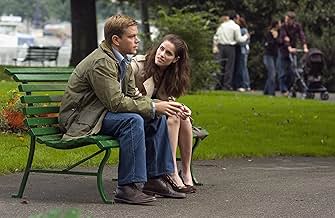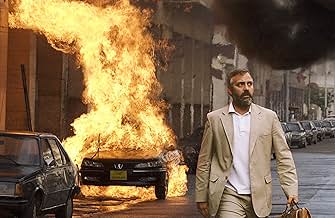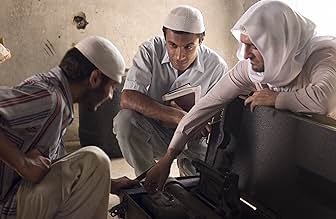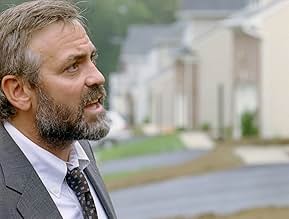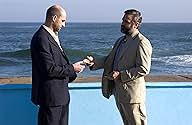Un'epopea politicamente carica sullo stato dell'industria petrolifera nelle mani di coloro che ne sono personalmente coinvolti e ne sono influenzati.Un'epopea politicamente carica sullo stato dell'industria petrolifera nelle mani di coloro che ne sono personalmente coinvolti e ne sono influenzati.Un'epopea politicamente carica sullo stato dell'industria petrolifera nelle mani di coloro che ne sono personalmente coinvolti e ne sono influenzati.
- Vincitore di 1 Oscar
- 13 vittorie e 30 candidature totali
Recensioni in evidenza
This technique to coordinate a huge ensemble of captivating character actors woven tightly together in a complex story is helped enormously by Robert Elswit's ever-moving camera shots as visually and sound edited by Tim Squyres, who had some experience with overlapping dialog and movement in a more literal upstairs/downstairs on Robert Altman's "Gosford Park." Alexandre Desplat's music adds to the tense mood.
The variegation that Gaghan presents is almost staggering, even more ethically complicated than a Graham Greene Cold War noir. This is the first film I've seen that illustrates the diversity of clashing Islamic cultures and interests, despite that I couldn't keep their interests or motives all quite straight. Though the English subtitles (which are commendably outlined in black for unusual legibility) wipe out some of the distinctions, we can infer that Iranians are speaking Farsi, Pakistanis' Urdu and others speaking Arabic, all with varying fluency and mutual cultural comprehension, let alone manipulators who can speak anything besides their native tongues. We've seen immigrants and guest workers in films critical of Western countries, but not the resentment-brewing conditions of badly treated non-citizens in the oil-rich Persian Gulf states, like the fictional one here which looks a lot like Dubai or Brunei, where clusters of modern skyscrapers contrast with Bedouin goat herders. It does help for background on the fascinating side plot of the radicalized young Arabs to see "Paradise Now" about Palestinian terrorists to explain particular details of their training.
While each character is specifically set within a believable home and family setting, some are painted with too easy and broad strokes. While Alexander Siddig seems to have the monopoly on naively idealistic Arabs, as his similar character in "Kingdom of Heaven" against another Crusades, history is littered with the interim, modernizing liberal tragically caught between powerful forces. (Though the proliferation of Western-educated Arab intellectuals in movies is beginning to sound like all those Japanese generals in World War II movies who went to USC or whatever; at least he went to Oxford and not Harvard.)
Matt Damon's un-Bourne-like energy analyst just sounds simplistic even when he's truth-telling, but we also see that he's already slid down the slippery slope of ethics in the crossing of his personal and professional lives. That so many of the oil and gas executives have Texas accents (superb Chris Cooper, Tim Blake Nelson, Robert Foxworth) does seem to say that the decades of business and political corruption there, as documented in Robert Caro's biography of LBJ, have simply been extended to a global scale.
The film is also unusual in focusing on the role of lawyers negotiating the deals between companies and governments. While Christopher Plummer's Ivy League senior partner type has been seen as a shadowy force in countless paranoid thrillers, Jeffrey Wright is completely unpredictable and tightly wound, though the point of his relationship with his cynical alcoholic father isn't exactly clear except maybe as his conscience. We see before our eyes he goes from, as his mentor says, "a sheep into a lion."
Most films have prosecutors like David Clennon's U.S. attorney as a hero against corruption, instead of being chillingly dismissed as "trust fund lawyers." But the script is so full of such epigrams, like "In this town, you're only innocent until you're investigated," that one character calls another on issuing them too brightly.
While from the beginning I couldn't quite follow all the machinations around George Clooney's character, he is wonderful at transforming from his usual Cary Grant suave to harried, dedicated, mid-level bureaucrat who literally won't toe the Company line in a dangerous hierarchy that's shown to be a bit more competent than in real life, that reminded me both in the gut and guts of Russell Crowe's Wigand in the tobacco wars in "The Insider." It recalls how benign corrupt spooks looked in their personal lives, as there's much conversation here about houses, cars and college tuition. Indirectly, the film implicitly shows the dangers to Valerie Plame from her outing as a CIA operative, as families and personal connections are constantly used as threats and bargaining chips.
Significantly, there is not a single mention amidst all these Mideast chicaneries, plots and plans of the Zionist entity, proving that pro or anti-Israel policies are smoke screens around the main draw -- oil.
Movie-wise, these characters seem a lot like the gangsters and their conseglieres in "The Godfather" carving up Cuba and drug rights, let alone Gordon Gekko extolling "Greed is good" as the ultimate ideology, and fits right in with this year's other geo-political thrillers "The Constant Gardener" and "Lord of War," and those weren't even about natural resources. It works better than the re-make of "The Manchurian Candidate" because even though the focal point is a fictional country the issues are real, not science fiction.
So does this make you ready to get out of your car and onto the train? Because until then, we'll still need lots of that oil from the Middle East.
The greatest problem with this movie is that it is too complex for only 126 minutes running time, due to the number of plots, subplots and characters; therefore its edition is tremendously confused with the use of many ellipsis. It would be more appropriated a mini-series, or a longer film. Even the title of this movie is very ambiguous, with many non-official explanations. The movie's website states that "'Syriana' is a very real term used by Washington think-tanks to describe a hypothetical reshaping of the Middle East." (http://syrianamovie.warnerbros.com/about.html). In the end, I truly found this movie a pretentious and sophisticated collection of clichés sold in a beautiful "package". My vote is six.
Title (Brazil): "Syriana A Indústria do Petróleo" ("Syriana The Oil Industry")
Just before I went to the movie theatre, I saw an interview with Steve Gaghan the director on the Charlie Rose Show, and probably this helped me to fit most of the pieces together. The scene where Bob (Clooney) is taken to visit Hezbollah leaders, is based on the exact experience the director had when researching the story. He said that most of the film was based on his or Bob's actual experiences.
So what do we have....Oil, big oil, oil executives, oil analysts, oil geography, oil politics, big time oil power brokers, CIA, Islamic terrorists, Middle East culture....It's all there. And Steve Gaghan does a very good job in bringing it all together. His directorial debut. Very good acting all round, maybe the oldest boy and his mother Amanda Peet stand out.
I walked out of the theatre in an emotional daze, if that's possible. I will see this film again.
My coda.... What a rotten, ugly barrel of oil.
Stephen Gaghan's first major directorial job presents the story in multiple settings running at the same time, which, for a great majority of the public will prove disorienting. Mr. Gaghan has adapted for the screen material like the one in "Syriana" before, so he wasn't a stranger working in that format.
What "Syriana" presents is a sort of rat race for the control of the oil in the Persian Golf, by whatever means necessary. Ultimately, the ones in control of that commodity will dominate the world. We are given about five different narratives in the film that interplay one another in the most unexpected ways. In fact, all these different subplots have a lot more in common than really meets the eye. One could almost recommend the viewing of the film a couple of times in order for all the different parts to come together in our minds and by doing so, the viewer will see the inner mechanisms of this intricate tale of corruption, greed and power.
The cast is enormous. There are a lot of different acting styles in the film. An almost unrecognizable George Clooney plays Bob Barnes, the CIA operative fallen from grace who is instrumental in set the story in motion and who reappears at the end at the climax of the action. Jeffrey Wright does a tremendous job as the lawyer who discovers the hidden mystery in a performance that is completely different from whatever he has done before in the screen. Matt Damon plays the ambitious young man who is at the top of his profession and can help Prince Nasir with his revolutionary views about changes in his country and the Arab world. Ultimately, Wasim, the poor Pakistani guest worker makes the case for the displaced youth of that world that is willing to go ahead and commit the ultimate sacrifice.
There are also good appearances by some seasoned actors that only appear shortly. Tim Blake Nelson, Chris Cooper, Jayne Atkinson, Akbar Kurtha, William Hurt, Christopher Plummer, Robert Foxworth and the rest are seen briefly.
Robert Elswit photographed the film in the different locations and makes it look better. The music score by Alexandre Desplat is heard in the background without interrupting the action. The editing by Tim Squires works well with the action. Stephen Gaghan shows he can do well working with Mr. Baer's material and made an interesting film that while it will irritate some viewers, on the whole he had the right idea in the way to tell this story.
Lo sapevi?
- QuizGeorge Clooney suffered a spinal injury during a stunt. Due to the weight he gained for his role, the injury left him bedridden for a month and caused severe migraines, which prevented him from doing publicity for Ocean's Twelve (2004). The injury was eventually corrected with surgery. Clooney has since called his weight gain "pretty stupid".
- Blooper(at arouns 3 mins) The scene is supposed to be located in Tehran, but on the license plate of Bob's car it is misspelled as Nehran (one dot failing). In Iranian movies and serials, cars have white license plates with all characters in one line, but this license plate is yellow with the text written on two lines. The Arabic numerals 4, 5 and 6 are different from the Persian numerals; this license plate shows an Arabic 4 and 6.
- Citazioni
Bryan Woodman: But what do you need a financial advisor for? Twenty years ago you had the highest Gross National Product in the world, now you're tied with Albania. Your second largest export is secondhand goods, closely followed by dates which you're losing five cents a pound on... You know what the business community thinks of you? They think that a hundred years ago you were living in tents out here in the desert chopping each other's heads off and that's where you'll be in another hundred years, so, yes, on behalf of my firm I accept your money.
- Curiosità sui creditiThere are no opening credits after the title is shown.
- ConnessioniFeatured in HBO First Look: Syriana (2005)
- Colonne sonoreLet Da Monkey Out
Written by Redman (as Reggie Noble), Erick Sermon and Johnny 'Guitar' Watson (as Johnny Guitar Watson)
Performed by Redman
Courtesy of The Island Def Jam Music Group
Under license from Universal Music Enterprises
Contains samples from "If I Had The Power"
Performed by Johnny 'Guitar' Watson
Courtesy of Concord Music Group, Inc.
I più visti
Dettagli
- Data di uscita
- Paesi di origine
- Sito ufficiale
- Lingue
- Celebre anche come
- See No Evil
- Luoghi delle riprese
- Aziende produttrici
- Vedi altri crediti dell’azienda su IMDbPro
Botteghino
- Budget
- 50.000.000 USD (previsto)
- Lordo Stati Uniti e Canada
- 50.824.620 USD
- Fine settimana di apertura Stati Uniti e Canada
- 374.502 USD
- 27 nov 2005
- Lordo in tutto il mondo
- 93.974.620 USD
- Tempo di esecuzione2 ore 8 minuti
- Colore
- Mix di suoni
- Proporzioni
- 2.39 : 1









